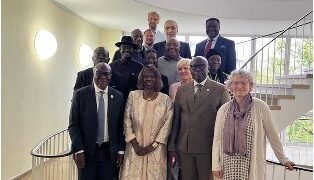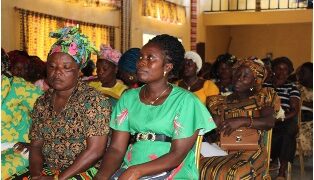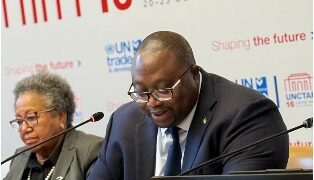The Vice President of the Republic of Sierra Leone, Dr. Mohamed Judell Jalloh, has described the proposed Fiscal Decentralization Policy as one that better positions the local councils to drive development and service delivery at the local level. Dr. Juldeh Jalloh added that the policy provides additional authority and resources to the local councils and further describes it as one that is pivotal in actualizing the 2020 Decentralization Policy.
He made this statement on Tuesday, 4th February, at the New Brookfields Hotel while delivering a keynote address in the capacity of Chairman of the Inter-Ministerial Committee and Decentralization on Local Governance during a workshop on Fiscal Decentralization Policy and its Implementation Strategy organized by the Fiscal Decentralization Division in the Ministry of Finance with support from the Accountable Governance for Basic Service Delivery Project, which is a World Bank-funded project under the Ministry of Finance.

The Vice President pointed out that the Fiscal Decentralization Policy intends to guide the overall fiscal decentralization programme, it is expected to provide a stable and transparent fiscal framework to guide the allocation of expenditures, functions, resource mobilization and, most importantly, intergovernmental fiscal transfers. As such, he added that the Fiscal Decentralization Policy provides the policy framework to support the implementation of the 2020 National Decentralization Policy, particularly in three key areas: effective allocation, financial autonomy, and decision-making at the local level. “The fiscal decentralization policy calls for effective participation of every stakeholder, including the Inter-Ministerial Committee that I chair and serve. I pledge the support of the Inter-Ministerial Committee on Decentralization and Local Governance. The IMC stands ready to support the implementation of the policy, and the support will include ensuring that the necessary resources and institutional support that are expected to be provided from ministers and ministries, departments, and agencies are provided, including the political will,” said the vice president as he declared the workshop on fiscal decentralization policy officially open.
Speaking at the Fiscal Decentralization Policy event as the donor partner, the World Bank’s Country Manager in Sierra Leone, Abdu Muwonge, acknowledges decentralization as a key reform that is at the center of the government’s delivery and the national development plan (both the current and the previous one) and that it is also in line with the World Bank’s strategic plan, which the Bank’s support to decentralization is critical and is in line with the Bank’s development framework. He added that building institutions matters, to which local institutions play a critical role. Looking at fiscal decentralization is considered by the bank as a key enabler to the delivery of services at the local level.
It is hoped that together we shall be able to achieve the fiscal decentralization as laid out in the policy grounded by the Local Govt Policy Act, truly translating the intentions into gains for both the local councils, national authorities, and the development partners. Thus the reason the World Bank, as a development partner, is present is to facilitate conversions on three aspects, which is a challenge to all of us: (i) making sure that the policy is translated into concrete actions within the constraints the local councils face, the MoF, and the government faces—our real challenge starts with outcomes: what outcomes do we want to see in human capital at the local level, outcomes in education, better learning conditions, improved health services delivered to the people, and how many kilometers of road are rehabilitated? “ Agreed, the local councils need more money, but outcomes matter! A policy would be as good only if it translated into the intended outcomes. The second area is, what outcomes do we want to see in local climate actions? I am signaling it in this house specifically: the level of devastation to our forest cover is unacceptable, and we need to see the role of local councils improve to really step up local climate actions. This means that within the confines of the local policies and development plans, how are you going to work with the chiefdoms in bringing about a reversal in terms of the deterioration of forest cover and likewise opportunities related to climate actions? These are areas the local councils can play a huge role in, and I think we have to put our hands together. Thirdly, it is to the national project coordinating units. Personally, the performance of the Accountable Governance project has been suboptimal,” said the WB Country Manager.
The World Bank Country Manager therefore urged the national project coordination units, including the Accountable Governance, to do business differently, if at all, if the PMU wishes to prepare for the next phase of the project. He called on donor projects to be enablers by creating partnerships and building platforms for the delivery of services.
He further urged the project stakeholders to focus more on partnerships in delivering on the Fiscal Decentralization Policy, as there is a plan for the second phase of the AGBSD Project. He cautioned that there is a need for a fundamental shift in how policy on fiscal decentralization would work. Agreed, there are challenges as there is never a perfect system, even in much more developed countries. However, if project coordinating units build synergies and have the commitment to see people follow through, you will see change start happening.
He concluded his remarks that there is an opportunity for the next phase of the decentralization project, which is a Project for Results (P4R), which will be implemented on an incentive basis, and operationalizing the policy will be captured under the P4R.
The Minister of Finance, Sheku Ahmed Fantamadi Bangura, says the fiscal aspect of decentralization is key and therefore assured the local councils that the central government is very committed to supporting the implementation of the fiscal policy and its implementation strategy.
Minister Fantamadi Bangura informed the decentralization stakeholders that the new policy shall provide the framework for appropriate financial powers to be devolved to the local government services and enable them to deliver effective services.
“The policy would ensure allocation of resources in an efficient way, promote accountability in current development, where all citizens participate in all decision-making process in development in their localities”, said the finance minister.
He assured that the policy will be circulated to everyone and that there have been lots of consultations in the development of this policy at the local, district, and central levels to ensure that the policy meets the needs of every stakeholder. The policy provides clear guidance around how revenues and expenditures are allocated and also ensures clarity on how revenue structures are devolved to local councils and right down to the WARD level, including responsibility on revenue mobilization and clarity on intergovernmental grant transfer structures.
In his concluding remarks, he said it is believed that with proper regulation and structured policy guidelines, LCs will be given access to resource flows to be able to take care of felt-needs investment projects within the Councils. LCs like the City Councils should be able to generate more revenue to be able to take care of their development needs.
The local government and community affairs minister, Tamba Lamina, assured that his ministry will ensure that the policy is implemented to its fullest as he describes the local government as active beneficiaries of the fiscal decentralization policy.
The minister said the local government ministry should be at the center of fiscal decentralization, and the ministry should therefore be at the center of implementing it, whereby the Ministry of Finance should be seen as a facilitator of fiscal decentralization. With fiscal decentralization, there is a need for local councils to start asset auditing, which will help councils to map out their assets and thereby enhance their own-source revenue mobilization.
The Deputy Minister of Finance 1, Madam Kadiatu Allie, who doubles as the Chair of the Accountable Governance Project Steering Committee (PSC), assured the World Bank, other donor partners, and beneficiary agencies that the PSC will continue to execute its functions, which are to provide quality oversight in the smooth implementation of the project, approve Annual Work Plans and budgets, and ensure better coordination across sectors during project implementation, which are all geared towards achieving the project development objectives and the intermediate indicators.
This she added is a role the PSC will continue to provide until the closure of the project which project outcomes will be satisfactory and ultimately improve service delivery nationwide.























